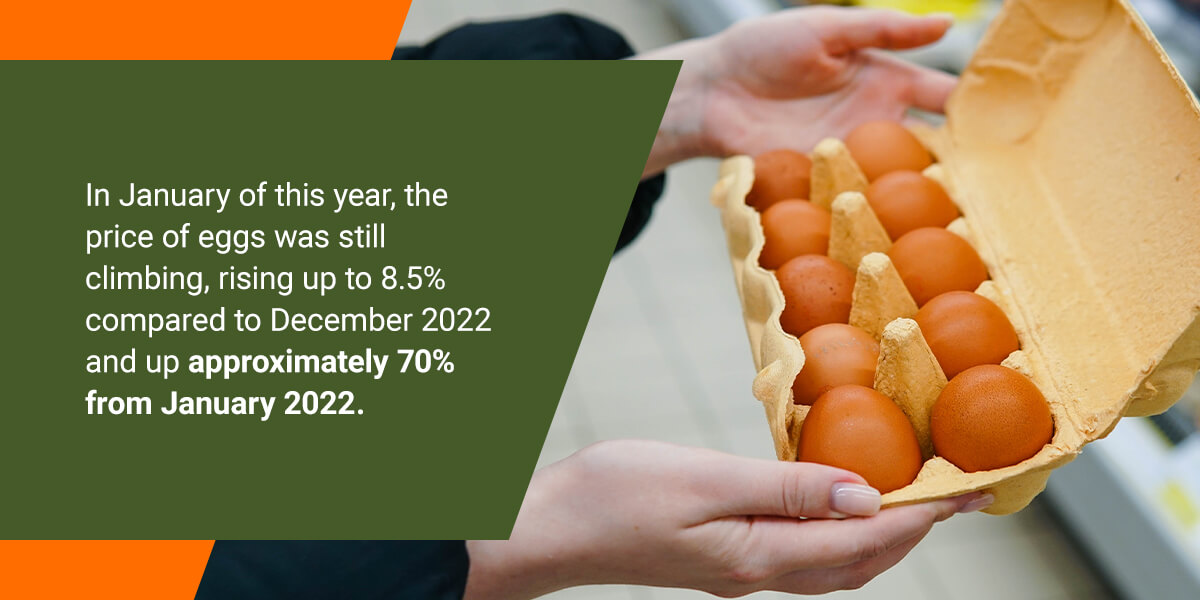
Egg Shortage Breakdown
Like everyone else, you’ve likely noticed the rising egg prices in grocery stores. Due to inflation and the general increased cost of food, your grocery bill may be higher than usual nowadays, particularly if you and your family eat a lot of eggs. Eggs are one of the most talked about items to have spiked in price, with some cartons going for eight to nine dollars a dozen.
Because eggs are a staple in most homes and provide a healthy source of protein and natural vitamins, it can be difficult to figure out how to curb these costs. However, if you buy and raise chickens, you can avoid the egg shortage and high costs by having a steady flow of eggs right in your backyard. In this guide, we’ll discuss everything you need to know about the egg shortage, what’s causing it, and how you can care for your own backyard farm animals.
Causes of the Egg Shortage
Though there has been much speculation since the start of 2023, several factors have led to the egg shortage and increased prices. The first is the widely discussed avian influenza — or more commonly known as the bird flu. This illness affected approximately 60 million birds last year, putting many farms out of business.
This disease spreads quickly through droppings and saliva — even one sick chicken can infect the entire farm if not handled quickly. Because the avian flu is highly contagious and 100% fatal, this outbreak has led to a depopulation of over 40 million egg-laying hens. The result is significantly fewer eggs being produced.
Typically, egg-producing hens can lay about one egg per day, which can seem like an incredibly small amount, given how often you might eat eggs. However, the flu is not the only reason for the egg shortage. Some states, like California, have banned the sale of eggs from caged birds, which is why you might see an increase in “cage-free” packaging on your cartons.
Due to inflation, the cost of transportation, packaging, fuel, and bird feed are also affecting the supply chain and forcing egg producers to raise the price of eggs, leading to lower availability.

The Price Spike
According to the Bureau of Labor Statistics, the price of eggs has increased nearly 50% within the last year, from $1.72 in November 2021 to $3.59 in November 2022. By December 2022, the national average price of a dozen eggs reached $4.25. Of course, now consumers are seeing a dozen eggs priced in New York at $8.79 and above. This increased rate has not been seen since the 1970s, when price freezes, shortages, and high costs resulted in high prices for certain agricultural products.
In January of this year, the price of eggs was still climbing, rising up to 8.5% compared to December 2022 and up approximately 70% from January 2022. In 2022, the price of eggs increased more than any other grocery item. Because the price spike for eggs continues to increase — and it’s a staple item that many households cannot go without — consumers are seeking alternatives, such as buying and raising their own chickens at home.
The states that have been hit the hardest with this price increase were those in the Midwest, including Iowa and South Dakota. Those in North Dakota, Minnesota, Nebraska, and West Virginia had to pay at least double for a dozen eggs compared to the prices in 2021.
Myths About the Egg Shortage
Since egg prices first skyrocketed, many social media and online users have created a conspiracy theory that chicken feed is the culprit for the increased prices and lack of availability. First and foremost, it’s important to note that egg-laying can naturally decrease or stop for many reasons, including:
- Insufficient sunlight during the winter time
- Broody hens who lay on their eggs and do not lay more until they hatch
- Adding new chickens to a flock and causing disruption
- Owning certain breeds that don’t lay as many eggs
- Old age
- Stress
- Nearby predators
- Extreme weather conditions
Any of these reasons can contribute to the overall egg shortage. Even something as fundamental as the breed of chicken can contribute to the number of eggs. Some online users even suggest that egg producers and feed producers intentionally made deficient feed that did not contain enough protein and minerals for chickens to produce eggs, leading to price hikes.
While those in the poultry industry know that avian influenza is to blame, as it has occurred in the past, the suggestion that feed producers intentionally withhold nutrients from animals for their profit margins is a myth. The true causes for increased egg prices include avian influenza, inflation, and high shipping, labor, and ingredient costs.
Feeding is the most important part of raising chickens, as they require a healthy, balanced diet to maintain and increase their egg production. Luckily, there are plenty of options out there for organic, non-medicated, non-genetically modified organism (GMO) livestock products so consumers can feel confident in what they’re giving their chickens to help them grow and produce eggs.
The Increase in Home Chickens
In the face of higher costs that don’t seem to be going away anytime soon, many consumers are raising chickens at home to cut the cost of paying for eggs. Animal products in general are becoming more expensive, and since no one knows when these inflated prices will go back to normal, raising home chickens can save money over the long term.
If you and your family enjoy eggs every morning for breakfast or bake as a fun hobby, you may consider this alternative to the limited availability and high prices of store-bought eggs. Raising backyard chickens offers many benefits and can even create fun family memories. These creatures can truly become part of the family, and you can teach young children about animal husbandry and environmental stewardship from home.

Nature’s Best Provides an Egg-Laying Solution
The price of eggs may continue to stay at their high prices, along with many other staple grocery items. However, this doesn’t mean you must forego eggs in your household. Raising chickens is a sustainable and natural way to provide you and your family with plenty of eggs without having to pay extreme prices or drive to several stores just to find a carton.
With Nature’s Best Organic Feeds, you can raise your egg-laying hens on our organic, nonmedicated, non-GMO Project Verified poultry feed to help increase egg production in your chickens and keep your birds healthy. As the leading certified organic feed manufacturer in the United States, it’s our goal to help your backyard chickens thrive and receive all the essential nutrients they need.
Contact us today to learn more about our products or use our store locator tool to find our feed near you.